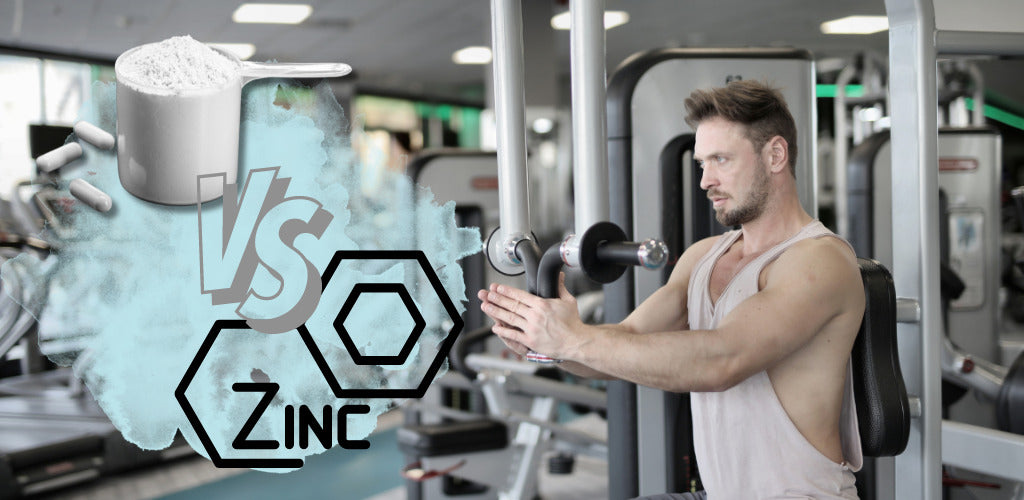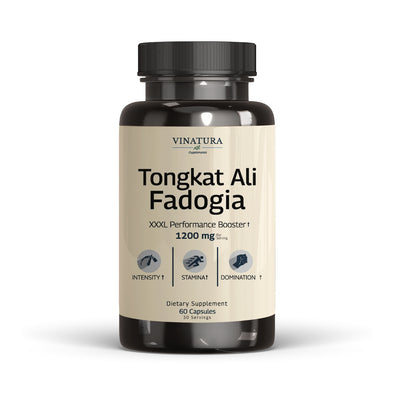
ZMA vs HMB: Which Supplement Should Bodybuilders Choose?
ZMA and HMB are two popular and widely used dietary supplements for bodybuilders. This article discusses the benefits of HMB and ZMA for bodybuilders, providing readers with an overview to help them make the most informed decisions for their needs.
Before exploring further, please read the disclaimer located at the end of this webpage.
What is HMB, and What are Its Main Benefits for Bodybuilders?
HMB, or beta-hydroxy beta-methylbutyrate, is a metabolite of the amino acid leucine, crucial in protein synthesis and muscle recovery.
While the human body naturally produces HMB in small amounts, around 0.2 - 0.4 grams per day, many people use HMB supplements to maximize their benefits.
Easy to use, HMB offers numerous benefits:
- Limits muscle loss: HMB prevents the activities of genes and enzymes that promote protein breakdown, thereby limiting muscle loss [11].
- Muscle development: HMB benefits for muscle by supporting muscle mass increase and strength development and improves workout performance.
- Reduces inflammation and aids in fat loss: HMB can help reduce inflammation and support fat loss in the body [2].
- Enhances the body's adaptation to exercise, making workout routines more effective [2].
- Improves muscle strength and body functions, particularly in older adults [1].
- HMB may support weight loss by reducing fat when combined with regular exercise.
Explore more: HMB Vs HICA: Are Metabolism Leucine Benefits for Body Composition?
What is ZMA, and What are Its Main Benefits for Bodybuilders?

ZMA, short for Zinc Magnesium Aspartate, is a joint dietary supplement combining zinc, magnesium, and Vitamin B6. Athletes, bodybuilders, and fitness enthusiasts use ZMA to enhance workout performance and muscle development.
ZMA provides several benefits for bodybuilders:
- Muscle growth [4].
- Immune system enhancement: Zinc, magnesium, and Vitamin B6 are crucial in maintaining immune health [4].
- Supports natural testosterone production, thereby aiding muscle growth [4].
You may also like: HMB Vs. BCAA: Can You Take HMB And BCAA Together?
What Differences Between ZMA vs HMB?
Both ZMA and HMB have their benefits and strengths. The table below will help us have a more comprehensive view of the difference between ZMA and HMB.
| Criteria | ZMA | HMB |
| Effective Ingredients | Zinc, Magnesium, Vitamin B61 | (Hydroxymethylbutyrate) is a substance that your body produces naturally when it breaks down the amino acid leucine. |
| Effective Claims | Boost muscle growth, strength, improve endurance, and recovery. | May aid muscle growth, reduce muscle breakdown, improve endurance, and exercise recovery. |
| Decrease Body Fat | Yes [6] | Yes |
| Decrease Protein Breakdown | X | Reduce muscle breakdown |
| Improve Cardiovascular Endurance | Not found | Yes [7] |
| Improve Cognitive Ability | Not found | Yes |
| Improve Immune Function | Yes | Yes [5] |
| Improve Mood | X | Yes, combined with arginine, and glutamine [9] |
| Improve Muscular Endurance | Yes | Yes |
| Improve Recovery | May improve recovery | May improve recovery |
| Improve Sports Performance | X | Yes [8] |
| Increase Muscle Mass | Increase muscle mass | Increase muscle mass |
| Increase Protein Synthesis | X | Enhance protein synthesis |
| Increase Testosterone | Support increase Testosterone | X |
| Lower Blood Pressure | X | Yes [10] |
| Reduce Muscle Damage | X | Reduce muscle damage |
The comparison table of ZMA and HMB
ZMA vs HMB: Which Supplement Is Better?

Both ZMA and HMB play crucial roles for bodybuilders.
HMB benefits for bodybuilding by supporting reducing muscle breakdown, preserving muscle, and enhancing recovery, especially for beginners undergoing high-intensity training.
According to a study, 34 men supplemented with 3g of HMB daily and strength training for 9 weeks showed significant improvements in muscle strength [11].
On the other hand, ZMA primarily benefits by supplementing essential minerals and vitamins, thus promoting overall health and optimizing endocrine health.
Athletes and fitness enthusiasts commonly use ZMA to support recovery and maintain optimal hormone levels.
Combining zinc, magnesium, and vitamin B6 is vital for muscle recovery and function.
However, HMB might be a better choice for those aiming to minimize muscle loss during physically demanding times or calorie deficits.
The benefits of HMB for bodybuilders are increasingly researched and clearer. Regardless of the chosen product, combining it with a balanced diet and a well-structured workout plan is essential.
Conclusion
ZMA and HMB offer positive benefits to people who want to participate in bodybuilding activities, such as bodybuilders.
HMB is effective in reducing muscle breakdown, preserving muscle mass, and supporting recovery, which makes HMB is especially beneficial for those who are strengthening their muscles or starting their education process.
On the other hand, ZMA will provide essential minerals and vitamins for overall health, support muscle recovery, and optimize hormones.
The effectiveness of these functional products may vary, depending on individual factors such as diet, exercise, and education habits of each person.
Read more:
- Is Hmb a Steroid? Is HMB Better Than Steroids?
- Can You Take Leucine And HMB Together?
- When To Take HMB? Best Ways And Time To Take HMB
References
- [1]. Courel-Ibáñez, Javier, et al. “Health Benefits of β-Hydroxy-β-Methylbutyrate (HMB) Supplementation in Addition to Physical Exercise in Older Adults: A Systematic Review with Meta-Analysis.” Nutrients, vol. 11, no. 9, 3 Sept. 2019, p. 2082, https://doi.org/10.3390/nu11092082.
- [2]. Portal, Shawn, et al. “The Effect of HMB Supplementation on Body Composition, Fitness, Hormonal and Inflammatory Mediators in Elite Adolescent Volleyball Players: A Prospective Randomized, Double-Blind, Placebo-Controlled Study.” European Journal of Applied Physiology, vol. 111, no. 9, 16 Feb. 2011, pp. 2261–2269, escholarship.org/uc/item/3f07750g, https://doi.org/10.1007/s00421-011-1855-x.
- [3]. ---. “Effect of Training on Zinc Metabolism: Changes in Serum and Sweat Zinc Concentrations in Sportsmen.” Annals of Nutrition and Metabolism, vol. 42, no. 5, 1998, pp. 274–282, https://doi.org/10.1159/000012744. Accessed 25 Feb. 2020
- [4]. Wilborn, Colin D, et al. “Effects of Zinc Magnesium Aspartate (ZMA) Supplementation on Training Adaptations and Markers of Anabolism and Catabolism.” Journal of the International Society of Sports Nutrition, vol. 1, no. 2, Dec. 2004, www.ncbi.nlm.nih.gov/pmc/articles/PMC2129161/, https://doi.org/10.1186/1550-2783-1-2-12.
- [5]. Nissen, Steven L., and Naji N. Abumrad. “Nutritional Role of the Leucine Metabolite β-Hydroxy β-Methylbutyrate (HMB).” The Journal of Nutritional Biochemistry, vol. 8, no. 6, June 1997, pp. 300–311, www.sciencedirect.com/science/article/pii/S095528639700048X, https://doi.org/10.1016/s0955-2863(97)00048-x. Accessed 21 Nov. 2019.
- [6]. Eduardo, C., Marcos Corrêa Junior, Capita, S., & Hugo Tourinho Filho. (2021, March 30). ZMA supplementation does not impact IGF-IGFBPs system or body composition of young athletes. ResearchGate; unknown. https://www.researchgate.net/publication/350496222_ZMA_supplementation_does_not_impact_IGF-IGFBPs_system_or_body_composition_of_young_athletes
- [7]. Nissen, S., et al. “β-Hydroxy-β-Methylbutyrate (HMB) Supplementation in Humans Is Safe and May Decrease Cardiovascular Risk Factors.” The Journal of Nutrition, vol. 130, no. 8, 1 Aug. 2000, pp. 1937–1945, https://doi.org/10.1093/jn/130.8.1937. Accessed 19 Aug. 2019.
- [8]. Fernández-Landa, Julen, et al. “Effect of the Combination of Creatine Monohydrate plus HMB Supplementation on Sports Performance, Body Composition, Markers of Muscle Damage and Hormone Status: A Systematic Review.” Nutrients, vol. 11, no. 10, 20 Oct. 2019, p. 2528, https://doi.org/10.3390/nu11102528.
- [9]. Rathmacher, JA, et al. “Supplementation with a Combination of Beta-Hydroxy-Beta-Methylbutyrate (HMB), Arginine, and Glutamine Is Safe and Could Improve Hematological Parameters.” Journal of Parenteral and Enteral Nutrition, vol. 28, no. 2, Mar. 2004, pp. 65–75, https://doi.org/10.1177/014860710402800265. Accessed 19 Aug. 2019.
- [10]. Wilson, Gabriel J, et al. “Effects of Beta-Hydroxy-Beta-Methylbutyrate (HMB) on Exercise Performance and Body Composition across Varying Levels of Age, Sex, and Training Experience: A Review.” Nutrition & Metabolism, vol. 5, no. 1, 3 Jan. 2008, https://doi.org/10.1186/1743-7075-5-1.
- [11]. Portal, S., et al. “Effect of HMB Supplementation on Body Composition, Fitness, Hormonal Profile and Muscle Damage Indices.” Journal of Pediatric Endocrinology and Metabolism, vol. 23, no. 7, Jan. 2010, https://doi.org/10.1515/jpem.2010.23.7.641.
Author

Product Disclaimer
The dietary supplement products mentioned on this website are formulated based on scientific research and adhere to FDA guidelines for dietary supplements. However, the content of the articles has not been evaluated by the Food and Drug Administration (FDA) and is not intended to promote or endorse any specific product. Any products sold on this website are not intended to diagnose, treat, cure, or prevent any disease.
Opinions and Endorsements
Any claims, statements, or opinions expressed in the articles are those of the author(s) and do not necessarily reflect the views or opinions of the manufacturers of the dietary supplement products. The products sold on this website are separate from the content of the articles and are not directly endorsed or associated with the information presented here.
Liability Disclaimer
The author(s) of the articles, website, and manufacturers of the dietary supplement products do not assume any liability for any potential consequences arising from the use of the information provided in the articles. It is recommended that individuals consult with a qualified healthcare professional before making any dietary or lifestyle changes, including the use of dietary supplements.
Product Usage
Please refer to the product labels and packaging for specific usage instructions and guidelines for the dietary supplement products sold on this website.
Customer Support
For any concerns or questions regarding the dietary supplement products, please contact our customer support team, who will be more than happy to assist you.





Leave a Comment
Be the first to comment.
What do you think?